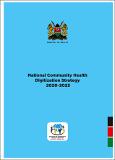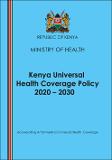| dc.description.abstract | Despite its importance, the delivery of community health continues to suffer from weak data collection and reporting tools. This hinders the optimal use of community-level data to inform public health response and resource allocation. The Ministry of Health recognizes the critical role played by information systems in measuring the performance of the healthcare delivery system and generating the necessary data to support program monitoring and evaluation. Consequently, the ministry has identified Information and Communication Technology as a key enabler towards the realization of Universal Health Coverage. Indeed, significant investments have been made in this regard, including in Electronic Medical Records systems, Laboratory Information Systems, the Kenya Health Information System, the Kenya Health and Research Observatory, among others. Despite these investments, the use of ICT for community health service delivery and data management continues to be limited. The process of reporting community health data from the field to the national level through the KHIS is paper based, which compromises the accuracy and timeliness of reports. Where digital information systems are available, they are siloed, poorly coordinated, partner-supported implementations with limited functionality and integration with the KHIS. The National Strategy for Community Health Digitization, therefore, seeks to address this gap by providing a framework to guide the development, deployment, and sustainability of digital interventions for community health in Kenya. The strategy was developed through a collaborative, multi-stakeholder process spearheaded by the MOH with the support of Living. | en |




